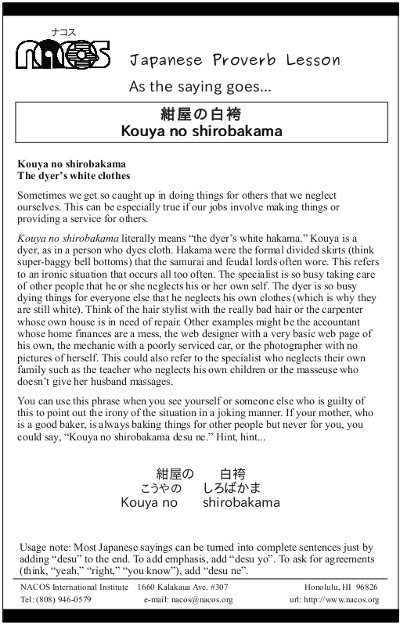Kouya no shirobakama
The dyer’s white clothes
Sometimes we get so caught up in doing things for others that we neglect ourselves. This can be especially true if our jobs involve making things or providing a service for others.
Kouya no shirobakama literally means “the dyer’s white hakama.” Kouya is a dyer, as in a person who dyes cloth. Hakama were the formal divided skirts (think super-baggy bell bottoms) that the samurai and feudal lords often wore. This refers to an ironic situation that occurs all too often. The specialist is so busy taking care of other people that he or she neglects his or her own self. The dyer is so busy dying things for everyone else that he neglects his own clothes (which is why they are still white). Think of the hair stylist with the really bad hair or the carpenter whose own house is in need of repair. Other examples might be the accountant whose home finances are a mess, the web designer with a very basic web page of his own, the mechanic with a poorly serviced car, or the photographer with no pictures of herself. This could also refer to the specialist who neglects their own family such as the teacher who neglects his own children or the masseuse who doesn’t give her husband massages.
You can use this phrase when you see yourself or someone else who is guilty of this to point out the irony of the situation in a joking manner. If your mother, who is a good baker, is always baking things for other people but never for you, you could say, “Kouya no shirobakama desu ne.” Hint, hint...
Usage note: Most Japanese sayings can be turned into complete sentences just by adding “desu” to the end. To add emphasis, add “desu yo”. To ask for agreements (think, “yeah,” “right,” “you know”), add “desu ne”.


